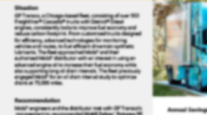Groups Urge Senators to Reconsider Plan to Use Fuel Fees for Nontransport Needs
This story appears in the May 24 print edition of Transport Topics.
More than two dozen transportation advocacy groups have asked the drafters of a Senate energy and climate bill to reconsider their legislation to allocate new revenue from transportation-based motor fuel fees to “activities entirely unrelated to improving the nation’s transportation infrastructure.”
In a three-page letter to Sens. John Kerry (D-Mass.) and Joseph Lieberman (I-Conn.), the groups said the current bill “significantly undermines” the user-fee principle for financing federal transportation improvements embodied in the U.S. Highway Trust Fund, which is financed mainly by fuel taxes and excise taxes on items related to transportation, such as tires.
The bill, introduced by Kerry and Lieberman on May 12, would set a price on carbon dioxide emissions by coal-fired power plants and other large polluters and would require oil producers to purchase emissions permits.
The legislation would create a “linked fee” system to dictate the price refiners would pay for carbon allowances, said Richard Moskowitz, vice president and regulatory affairs counsel for American Trucking Associations.
That could result in truckers paying more for diesel.
In 2013, the bill imposes a minimum carbon price of $12 per ton. “If refiners pass this cost on in equal amounts across their refined products, it would translate to a diesel fuel price increase of at least 15 cents per gallon,” Moskowitz said.
Two-thirds of the new revenues generated by the bill would be returned to consumers through energy bill discounts and direct rebates, Kerry said. The remainder would be spent to ensure a smooth transition for American businesses and to invest in projects and technologies to reduce emissions, advance the nation’s energy security and create new “green” jobs, he added.
The letter signers want 100% of the new fees to be invested in transportation.
The 28 groups that signed the letter included the American Association of State Highway and Transportation Officials, American Trucking Associations, American Road & Transportation Builders Association and the American Highway Users Alliance.
“Our preliminary analysis of the bill finds that tens of billions of dollars would be generated annually from new pollution fees on transportation motor fuels,” the May 18 letter said.
“In 2013, fees from on-road fuel consumption would generate at least $19.5 billion. Instead of returning revenue from these fees to improving the transportation system, the bill diverts at least 77% of the funds away from transportation infrastructure investment,” the letter said.
Speaking at a May 19 telephone news conference, John Horsley, executive director of AASHTO, said that the bill could preclude action on “vital highway and transit authorizing legislation.”
“It would divert revenues away from transportation and virtually make it impossible to pass the next five-year bill,” Horsley said.
The letter said that the groups hope to work with the Senate to develop a strategy that “promotes energy independence, reduces greenhouse gas emissions, and improves the condition and capacity of critical transportation assets.”
“In our collective judgment, the current bill does not achieve these objectives,” the letter said.
Stephen Sandherr, chief executive officer of the Associated General Contractors of America, said traffic congestion on U.S. highways wastes more than 2.8 billion gallons of fuel a year.
“By diverting all but a small percentage of the new transportation fees to unrelated uses, the bill neglects efforts to cut polluting traffic and wasteful congestion,” Sandherr said.




